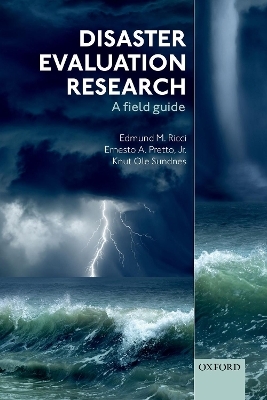
Disaster Evaluation Research
Oxford University Press (Verlag)
978-0-19-879686-2 (ISBN)
A human disaster is defined as a hazardous event that overwhelms the capacity of the local community to respond to the needs of the affected population. Medical and public health responses aim to provide care efficiently and promptly but all too often, responses are hampered by recurring mistakes. Analysing the factors at play such as the scale and frequency of disasters and the variety of challenges they present, is central to developing more effective response plans.
However the complexity of disasters often precludes reliable data collection, hampering the accuracy of the results, conclusions and recommendations required to improve responses. Disaster Evaluation Research: A field guide presents a new approach to the study of disaster by incorporating a mixed-methods research approach. This practical manual provides a range of reliable methods, robust approaches and proven techniques for the gathering and analyzing of data.
Written by leading evaluation scientists with a wealth of experience, the authors present their 'EIGHT Step Model' for disaster evaluation studies. This framework applies evaluation science to disaster responses, helping scientists to select key stakeholders effectively, write evaluation questions, use logic models and mixed-methods research design, prepare sampling plans, collect and analyse data, and prepare a final report. This guide also features useful tools for carrying out evaluations including; evaluation questions, indicators and data sources, resources, and questionnaires used in past evaluation studies.
Using a clear, accessible and step-by-step style this practical manual is easy to use in the field and essential reading for medical and public health professionals involved in disaster preparedness and response, humanitarian relief workers, policy analysts, evaluation scientists and epidemiologists.
Dr Edmund Ricci is Emeritus Professor of Sociology in Public Health and founding Director of the Institute for Evaluation in Public Health, both based in the University of Pittsburgh's, Graduate School of Public Health. He is an internationally recognized evaluation scientist who has designed and guided globally more than 300 program and policy oriented studies, including those designed to improve the medical and public health response to disasters. He currently serves as a member of the executive committee of the international Task Force on Quality Control of Disaster Management. Ernesto A. Pretto, Jr. M.D., M.P.H. (Epidemiology) is Professor of Clinical Anesthesiology, University of Miami Miller School of Medicine, and Adjunct Professor in the Graduate School of Public Health, University of Pittsburgh. Dr. Pretto is a Diplomate of the American Board of Anesthesiologists with Special Qualifications in Critical Care Medicine. Dr. Pretto's research has covered a wide range of fields in Medicine and Public Health. He has conducted post disaster field surveys in earthquakes in Armenia (1988), Costa Rica (1991), Turkey (1992), California (1994), and Japan (1995), during the war in Sarajevo, Bosnia (1993), and after the devastating earthquake in Haiti (2010). Knut Ole Sundnes MD, DiPH. Professor, Centre for Risk Management and Societal Safety at the University of Stavanger and Senior Scientist, Intervention Center, Oslo University Hospital. Dr. Sundnes is a certified specialist of anaesthesia, intensive care medicine and prehospital medicine. He was Head of Anaesthesia, Norwegian Armed Forces Medical Services (1996-2016). He was instrumental to restore the specialty of anaesthesia to Afghanistan (2006-2013). He served as President of the World Association for Disaster and Emergency Medicine from 2001-2005. He is co-editor and co-author of two books on Disaster Research in the Utstein Style and is highly published in the fields of disaster medicine, emergency medicine and anaesthesiology.
Part One: A Comprehensive Framework for Disaster Evaluation
1: A Brief History of Disaster Evaluation Studies
2: A General Framework for Evaluation
3: Introduction to a Model for Disaster Evaluation
4: Components of a Disaster Response System
Part Two: How to Design and Implement a Disaster Evaluation Study
5: Form the Stakeholder Group (Step 1)
6: Formulate Evaluation Questions (Step 2)
7: Construct Logic Model and Research Design (Step 3)
8: Prepare Mixed-Method Data Collection Instruments (Step 4)
9: Construct a Sampling Plan (Step 5)
10: Conduct a "Scout Survey" (Step 6)
11: Select and Train Field Research Team and Collect Data (Step 7)
12: Analyze Data and Prepare a Final Report (Step 8)
13: Ethical Considerations in Disaster Evaluation Studies
14: Epilogue
Appendices
A: Evaluation Questions, Indicators and Data Sources
B: Resources for Program Evaluation Studies
C: Questionnaires Used in past Evaluation Studies
| Erscheinungsdatum | 19.12.2019 |
|---|---|
| Verlagsort | Oxford |
| Sprache | englisch |
| Maße | 156 x 233 mm |
| Gewicht | 378 g |
| Themenwelt | Informatik ► Datenbanken ► Data Warehouse / Data Mining |
| Medizin / Pharmazie ► Medizinische Fachgebiete ► Notfallmedizin | |
| Studium ► Querschnittsbereiche ► Epidemiologie / Med. Biometrie | |
| Studium ► Querschnittsbereiche ► Prävention / Gesundheitsförderung | |
| Sozialwissenschaften ► Soziologie | |
| ISBN-10 | 0-19-879686-2 / 0198796862 |
| ISBN-13 | 978-0-19-879686-2 / 9780198796862 |
| Zustand | Neuware |
| Informationen gemäß Produktsicherheitsverordnung (GPSR) | |
| Haben Sie eine Frage zum Produkt? |
aus dem Bereich


